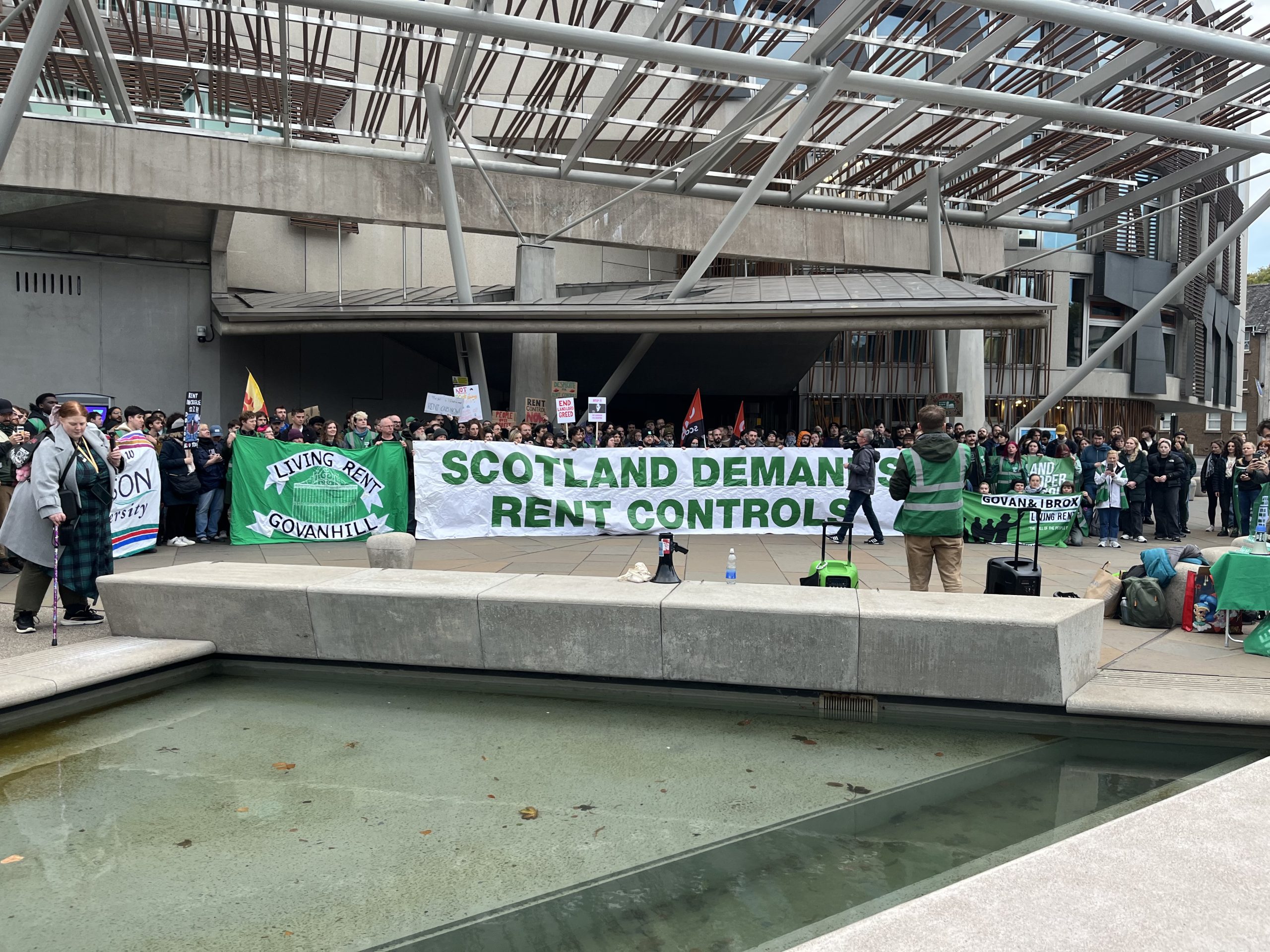
Interview | Tenant organising with Living Rent
Eilidh •At The World Transformed (TWT), rs21 members interviewed a range of activist groups. In this article we speak to Eilidh, an activist from Living Rent, Scotland’s tenants and community union, which has won significant victories in recent years.
Note: Eilidh spoke to us in a personal capacity.
rs21: Why did you set up your campaign and what do you do?
I organise with Living Rent, Scotland’s tenant and community union. We are a national union which has national, city-wide and local branches. We have a presence in the central belt of Scotland as well as in Aberdeen, Dundee and the Highlands & Islands. We do individual casework by supporting members in disputes – rent increases, repair problems, harassment. We also campaign at a local, city and national level. We host socials and political education events. We have been going for ten years. Living Rent started through the merging of a campaign for rent controls from the National Union of Students with people organising in EPTAG (Edinburgh Poverty Tenant Action Group) and Acorn Scotland.
rs21: What have you achieved since starting?
Living Rent has won thousands of pounds for tenants, through rent compensation and mould & repair compensation. We’ve also won million pound retrofitting schemes for working class communities and we’ve helped win more restrictions for Short Term Lets. Nationally, we’ve just won rent controls. In the past our big wins have included forcing the Scottish government to impose a temporary rent cap and ban on evictions, and a permanent end of no-fault evictions.
rs21: At the housing panel, there was a lot of talk about internationalising the tenants’ struggle. Is that something you’d like to see come out of TWT?
Collective strategy in the face of international landlords is really important. We’re all young organisations with our own strategies, but that doesn’t mean we shouldn’t learn from one another. Where tenants unions are succeeding is keeping a sense of radicalism as an inherent tendency of the movement. We don’t see that in the trade union movement in Britain especially, and if we keep that at the core of the work we do, i.e. not being a service model, then that brings us all round the table even if we have tactical disagreements.
rs21 : What traditions or historical struggles do you draw from, or feel a connection with?
Scotland has a really rich history of tenant organising, one that is entwined with the history of land justice. Historically, tenant organising in Scotland had been led by women, from women in the highlands during the clearances to Mary Barbour in Glasgow to now; a lot of our leaders in Living Rent are women. We also understand that the tenant as a political subject has particular elements for women. It’s not just an economic relation; the home has historically been a site for feminised struggles, and women have often been the caretakers of the community. So when public services get hit, e.g. councils making cuts to childcare or green spaces, some people don’t think this is relevant to tenants. We need to be precise and careful about how we politicise the subject and the struggle to ensure that’s included. That said, the tenants struggle is very much a workers struggle. Historically landlords have worked with employers when tenants have gone on rent strikes to take rent directly from wages when tenants have refused to pay. Now more than ever, with how drastically the cost of housing is increasing, and with long-term wage stagnation, we feel there’s a real need to situate tenant struggles alongside labour struggles; what good is a 5 per cent increase in pay when your landlord increases your rent by 20%?
rs21: There was a lot of mention of including people not in the typical idea of a tenant, such as unhoused or homeless people. Are you doing any work there?
As a tenants and community union, we are not the best placed organisation to support people living on the street with emergency support. However a significant portion of people made homeless come from people in the private sector, many of them due to insecure housing or high rents. Throughout our work we fight to ensure that no one is made homeless and that everyone has access to a safe, secure affordable home. Homelessness also manifests in different ways and many of our members have experienced a form of homelessness due to the nature of insecure housing. Our work is the fight to ensure this happens to no one else, and this is part of why we resist all evictions.
rs21: In the crudest, most immediate sense, what does your campaign mean for people?
We confront the economic power that landlords have over our daily lives. So many of our life choices are entirely dictated by our housing conditions. People are incentivised to move in with their partners or stay in unsafe relationships because they need housing. They can’t go for a new job because it might break a lease and put them or their housemates into insecurity. So much of our choices are controlled by that. As a personal example, I would love to have children, but the cost of rent makes that near impossible. It diminishes our future. In Scotland, for example, landlords being able to evict you threatens the roots you can put down in your community. I want a future where so much of my time isn’t occupied thinking about housing conditions. We forget how much these things take up time in our head. It’s the same with work. And when we don’t have to think about these things, we can think about art, sport, and a variety of hobbies. A future where we are fuller people.







0 comments